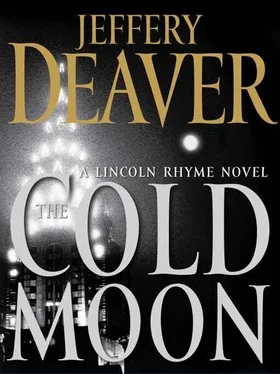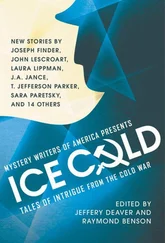Horology, Duncan had explained, was the study of time and timepieces.
The killer had come here several times recently. It drew the older man the way porn shops drew Vincent. Normally distant and unemotional, Duncan always lit up when he was staring at the displays. It made Vincent happy to see his friend actually enjoying something.
Duncan was looking over some old pottery things called incense clocks. Vincent eased up next to him.
"What'd you find?" asked Duncan, who didn't turn his head. He'd seen Vincent's reflection in the glass of the display case. He was like that-always aware, always seeing what he needed to see.
"She was alone in the workshop all the time I was there. Nobody came in. She went to her store on Broadway and met this delivery guy there. They left. I called and asked for her-"
"From?"
"A pay phone. Sure."
Meticulous.
"And the clerk said she'd gone out for coffee. She'd be back in about an hour but she wouldn't be in the store. Meaning, I guess, she'd go back to the workshop."
"Good." Duncan nodded.
"And what'd you find?"
"The pier was roped off but nobody was there. I saw police boats in the river, so they haven't found the body yet. At Cedar Street I couldn't get very close. But they're taking the case real seriously. A lot of cops. There were two that seemed in charge. One of them was pretty."
"A girl, really?" Hungry Vincent perked up. The thought of having a heart-to-heart with a policewoman had never occurred to him. But he suddenly liked the idea.
A lot.
"Young, in her thirties. Red hair. You like red hair?"
He'd never forget Sally Anne's red hair, how it cascaded on the old, stinky blanket when he was lying on top of her.
The hunger soared. He was actually salivating. Vincent dug into his pocket, pulled out a candy bar and ate it fast. He wondered where Duncan was going with his comments about red hair and the pretty policewoman but the killer said nothing more. He stepped to another display, containing old-time pendulum clocks.
"Do you know what we have to thank for precise time-telling?"
The professor is at the lectern, thought Clever Mr. V, having replaced Hungry Mr. V for the moment, now that he'd had his chocolate.
"No."
"Trains."
"How come?"
"When people's entire lives were limited to a single town they could start the day whenever they decided. Six A.M. in London might be six eighteen in Oxford. Who cared? And if you did have to go to Oxford, you rode your horse and it didn't matter if the time was off. But with a railroad, if one train doesn't leave the station on time and the next one comes barreling through, well, the results are going to be unpleasant."
"That makes sense."
Duncan turned away from the display. Vincent was hoping they'd leave now, go downtown and get Joanne. But Duncan walked across the room to a large case of thick glass. It was behind a velvet rope. A big guard stood next to it.
Duncan stared at the object inside, a gold-and-silver box about two feet square, eight inches deep. The front was filled with a dozen dials that were stamped with spheres and pictures of what looked like the planets and stars and comets, along with numbers and weird letters and symbols, like in astrology. The box itself was carved with images too and was covered with jewels.
"What is it?" Vincent asked.
"The Delphic Mechanism," Duncan explained. "It's from Greece, more than fifteen hundred years old. It's on tour around the world."
"What does it do?"
"Many things. See those dials there? They calculate the movement of the sun and moon and planets." He glanced at Vincent. "It actually shows the earth and planets moving around the sun, which was revolutionary, and heretical, for the time-a thousand years before Copernicus's model of the solar system. Amazing."
Vincent remembered something about Copernicus from high school science-though what he remembered most was a girl in the class, Rita Johansson. The recollection he enjoyed most was of the pudgy brunette, late one autumn afternoon, lying on her tummy in a field near the school, a burlap bag over her head, and saying in a polite voice, "Please, no, please don't."
"And look at that dial," Duncan said, interrupting Vincent's very pleasant memory.
"The silver one?"
"It's platinum. Pure platinum."
"That's more valuable than gold, right?"
Duncan didn't answer. "It shows the lunar calendar. But a very special one. The Gregorian calendar-the one we use-has three hundred and sixty-five days and irregular months. The lunar calendar's more consistent than the Gregorian-the months are always the same length. But they don't correspond to the sun, which means that the lunar month that starts on, say, April fifth of this year will fall on a different day next year. But the Delphic Mechanism shows a lunisolar calendar, which combines the two. I hate the Gregorian and the pure lunar." There was passion in his voice. "They're sloppy."
He hates them? Vincent was thinking.
"But the lunisolar-it's elegant, harmonious. Beautiful."
Duncan nodded at the face of the Delphic Mechanism. "A lot of people don't believe it's authentic because scientists can't duplicate its calculations without computers. They can't believe that somebody built such a sophisticated calculator that long ago. But I'm convinced it's real."
"Is it worth a lot?"
"It's priceless." After a moment he added, "There've been dozens of rumors about it-that it contained answers to the secrets of life and the universe."
"You think that?"
Duncan continued to stare at the light glistening off the metal. "In a way. Does it do anything supernatural? Of course not. But it does something important: It unifies time. It helps us understand that it's an endless river. The Mechanism doesn't treat a second any differently than it does a millennium. And somehow it was able to measure all of those intervals with nearly one hundred percent accuracy." He pointed at the box. "The ancients thought of time as a separate force, sort of a god itself, with powers of its own. The Mechanism is an emblem of that view, you could say. I think we'd all be better off looking at time that way: how a single second can be as powerful as a bullet or knife or bomb. It can affect events a thousand years in the future. Can change them completely."
The great scheme of things…
"That's something."
Though Vincent's tone must have revealed that he didn't share Duncan's enthusiasm.
But this was apparently all right. The killer looked at his pocket watch. He gave a rare laugh. "You've had enough of my crazy rambling. Let's go visit our flower girl."
Patrolman Ron Pulaski's life was this: his wife and children, his parents and twin brother, his three-bedroom detached house in Queens and the small pleasures of cookouts with buddies and their wives (he made his own barbecue sauce and salad dressings), jogging, scraping together babysitter money and sneaking off with his wife to the movies, working in a backyard so small that his twin brother called it a grass throw rug.
Simple stuff. So Pulaski was pretty uneasy meeting Jordan Kessler, Benjamin Creeley's partner. When the coin toss in Sachs's Camaro earned him the businessman, rather than the bartender, he'd called and arranged to see Kessler, who'd just returned from a business trip. (His jet, meaning really his, not a, jet, had just landed, and his driver was bringing him into the city.)
He now wished he'd picked the bartender. Big money made him uneasy.
Kessler was at a client's office in lower Manhattan and wanted to postpone seeing Pulaski. But Sachs had told him to be insistent and he had been. Kessler agreed to meet him in the Starbucks on the ground floor of his client's building.
Читать дальше












